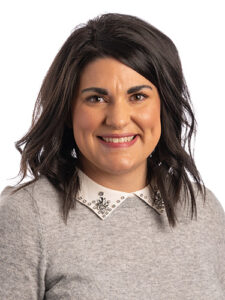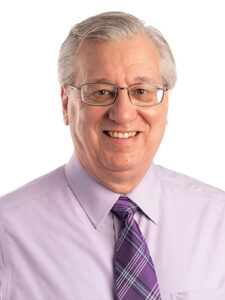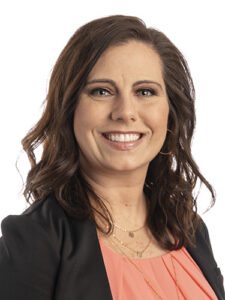Spotlight on the Department of Imaging Sciences — All Divisions
| Division of Diagnostic Medical Sonography
After my first year serving as the Director of the Diagnostic Medical Sonography (DMS) Program, I can say I am more grateful than ever for the leadership Anthony Baker modeled as program director. He was an alumnus of Nuclear Medicine Imaging Sciences and DMS programs. Tony knew what students needed to succeed and always kept them in mind. He drew on 20+ years of active duty military service to lead the DMS program. Congrats on your retirement, Tony!

Layla Simmons, M.Ed., RDCS, RDMS, program director and assistant professor
For the first time in 10 years, the DMS program admitted a cohort of students on the UAMS NW Campus in Fayetteville. With the increasing demand for sonographers across the state, we are excited to prepare competent, compassionate sonographers for the growing workforce in that region. We admitted four students for the NW Campus cohort, along with 13 students on the Little Rock campus. Admission for these cohorts was particularly competitive, with average GPAs about 3.80.
Faculty have worked tirelessly to adapt to the ever-changing COVID pandemic conditions and to create multiple contingency plans so that our last two cohorts of students could graduate on time and enter the workforce. Speaking of outstanding faculty, DMS faculty member Megan Lane was recently promoted to Assistant Professor and is excelling in her new role as Clinical Coordinator. New faculty member Lori Kimbrow joined our team on the NW Campus from Highlands Oncology. Lori has extensive clinical experience across multiple specialty areas. We are very excited to have a complete team across the two campuses.
The program is continuing to develop new opportunities for interprofessional collaboration across the UAMS system. Our faculty and students now routinely provide free imaging services for:
- UAMS 12th Street Health & Wellness Center
- UA Fayetteville Razorback Athletics
- UAMS Clinics in Northwest Arkansas
It has been a challenging, yet incredibly fulfilling time for the DMS program. DMS students continue to thrive and are some of the most sought after sonographers by employers.
Division of Nuclear Medicine Imaging Sciences
Nuclear Medicine Imaging Sciences (NMIS) continues to educate future nuclear medicine technologists using online education. Students are located statewide in Little Rock, Pine Bluff, Jonesboro, Fayetteville, Rogers and Fort Smith, as well as out of state in Dallas, Tyler and Longview, Texas and in Tulsa, Oklahoma.

Arthur Maune, M.A. Ed., CNMT, division director
Despite the global pandemic, the program’s decades 20 years of online experience allowed it to continue providing a quality didactic education. Though students experienced some time away from their clinical rotations in 2020, faculty were able to develop several clinical simulations and by using Zoom were able to keep the students involved in practicing their clinical and patient care skills. All students completed their competency requirements and graduated on time.
The NMIS program completed the Joint Review Committee in Nuclear Medicine Technology accreditation process in the summer of 2019 and received a full 7-year accreditation with no deficiencies reported.
In December 2019, Summer Khairi, MBA, CNMT, NMTCB(CT) was hired as a full-time faculty member. She brings a varied clinical experience to the program and has taken over the position of Clinical Coordinator. Summer serves the campus as an IPE master facilitator. Shannon Youngblood, Ed.D., MSRS, CNMT continues to provide valuable didactic education as adjunct faculty. In August 2020 and 2021, 14 students completed the program. Twenty students, a full cohort, began the program in August 2021.
For the last three graduating classes, the students achieved a 93% first-time pass rate on the national certification examinations, along with a 75% job placement rate within six months of graduation.
The program offers a wide variety of clinical sites for student rotations, giving the students experience working in various environments, as well as providing networking opportunities. Feedback from clinical affiliates and employers has been overwhelmingly positive concerning students and past graduates. The program plans to expand student clinical rotations by adding additional sites in Jonesboro, Batesville and Fort Smith, Arkansas and in Tyler, Texas.
Division of Radiologic Imaging Sciences
Throughout the ongoing global pandemic, the Division of Radiologic Imaging Sciences (RIS) has sustained its mission to educate and prepare future radiologic technologists. The program has continued to enroll a full cohort of 40 students combined on both campuses. The Bachelor-Completion program provides an opportunity for radiographers nationwide to further their education and advance their careers.

Lisa Rhoden, M.Ed., RT, CNMT, division director
Challenges from the pandemic have included virtual teaching in place of face-to-face lectures, smaller lab groups, and reduced clinical space at times, but the faculty have adapted and always ensure students continue to receive a high-quality educational experience.
The RIS program is one of only two nationally accredited radiography programs in the state to offer a Bachelor’s degree, and the only one to prepare students for two registry exams. After successfully completing the two-year program, our graduates are prepared for two national certification examinations: one in radiography and one in an advanced modality they choose to pursue, which makes our graduates very valuable in the healthcare field. These modalities include CT, MRI, mammography, vascular imaging, or cardiac imaging. The program offers more clinical sites for student rotations than any other program in the state, giving the students more experience working in various environments, as well as providing many opportunities for career networking. Feedback from clinical affiliates and employers has been almost universally positive concerning our students and graduates.
In the past year, the program has had several noteworthy accomplishments. Our students achieved a 97% first-time pass rate on the national certification exam in radiography, along with continuing to achieve a 100% job placement rate. Faculty also completed the JRCERT Interim Report, which is a requirement for continuing program accreditation. In addition, two faculty members received promotions in academic rank in the last year. Other faculty accomplishments include successfully passing a national certification exam in an advanced modality, being elected to chair a state committee, earning distinction as a site visitor apprentice for our accreditation organization, working towards certification in a new modality, becoming an IPE master facilitator, and being selected to speak at a national conference.